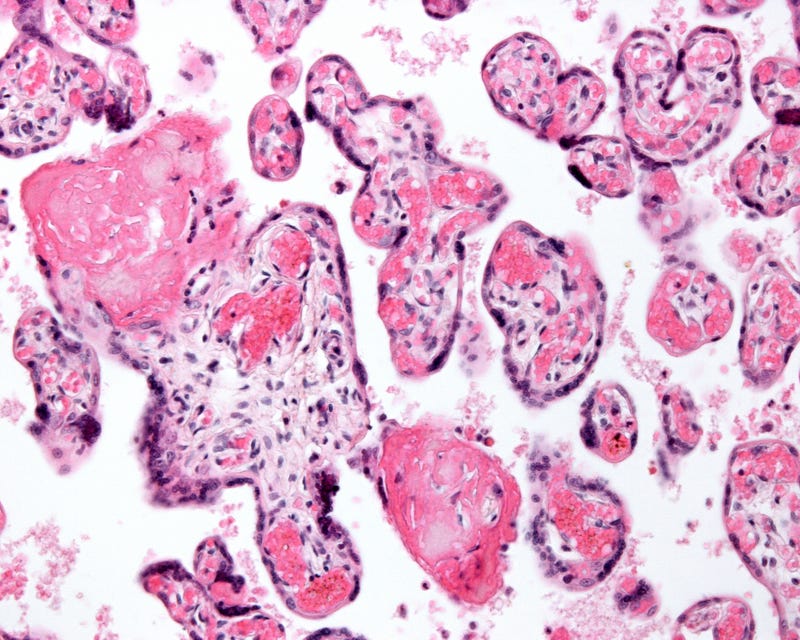
COVID-19 infection can cause a condition called placentitis, or inflammation of the placenta, which can lead to still births, according to a study published Thursday in the Archives of Pathology and Laboratory Medicine.
This study focused on autopsy pathology findings from 64 stillbirths and four neonatal deaths related to mothers with COVID-19. All placentas studied by a team of 44 specialists from 12 countries tested positive for SARS-CoV-2.
According to the March of Dimes, a non-profit that works to improve the health of mothers and babies, stillbirths refer to babies that die in the womb after 20 weeks of pregnancy. Neo-natal deaths occur within the first 28 days of a baby’s life.
Study results found that all 68 placentas – organs that develop in a woman’s uterus during pregnancy to provide oxygen and nutrients to the fetus – had increased fibrin deposition and villous trophoblast necrosis. Fibrin is a tough protein substance and villous trophoblast necrosis refers to cell death within the placenta. All but two of the placentas also had chronic histiocytic intervillositis, or rare placental lesions.
Together, the three findings were identified as SARS-CoV-2 placentitis, said researchers. They also observed other types of placenta damage.
“At these high levels of placental damage, the placenta cannot function at the level necessary to provide sufficient oxygen and nutrients to the fetus to sustain life,” said the study.
“We have never seen this level of destruction from an infectious illness before,” said Dr. David Schwartz, a perinatal pathologist in private practice in Atlanta who led the study, according to NBC News. “These fetuses and newborns died from asphyxiation due to lack of oxygen.”
Schwartz said SARS-CoV-2 has a different impact than diseases such as zika, rubella and syphilis, which attack the fetus.
The abnormalities observed in placenta from the COVID-19-carrying mothers caused “widespread and severe placental destruction resulting in placental malperfusion and insufficiency,” said the study. Malperfusion is the loss of blood supply to a vital organ caused by an arterial obstruction.
“Perhaps the most important finding in this study relates to the degree of involvement of the placentas from the destructive lesions that constitute SARS-CoV-2 placentitis,” said researchers. “This extent of placental damage and consequent malperfusion is striking.”
While SARS CoV-2 impacted the placenta, there was no evidence that SARS-CoV-2’s impact on the fetus resulted in any of the deaths studied. In these COVID-19-related cases, death likely resulted from placental insufficiency and related brain injury. SARS-CoV-2 was detected from a body specimen in 16 of 28 study cases tested and four of the autopsied stillborns had SARS-CoV-2 identified in internal organs.
“We believe that our pathology data are strongly suggestive of a process that is occurring over a period ranging from several days up to [two weeks] after onset of maternal symptoms or positive COVID-19 testing,” said the study authors.
They recommend that pregnant women who test positive for COVID-19 be closely monitored for two to three weeks for fetal well-being. Health care providers could possibly use ultrasounds to screen for those at risk.
Additionally, study authors said vaccination could help reduce the COVID-19 viral burden on mothers and therefore decrease their risk of developing placentitis and risk of stillbirth.


